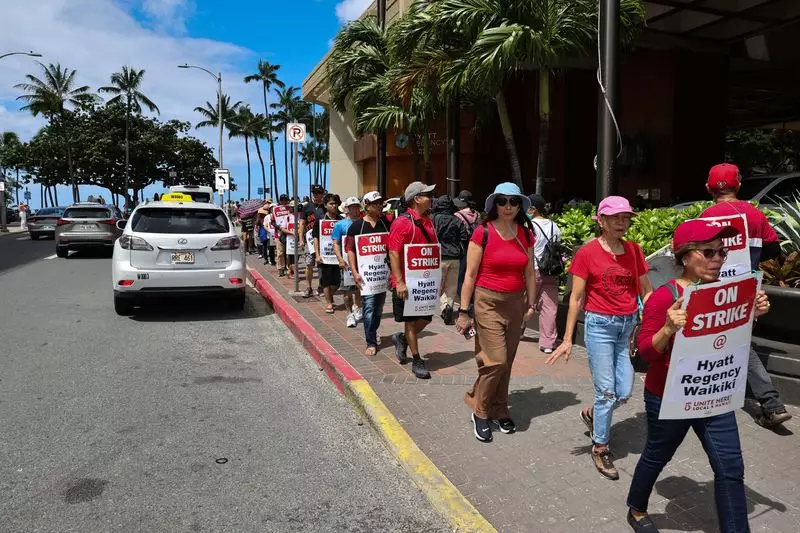The recent strike involving approximately 10,000 hotel workers across various cities in the United States has brought attention back to labor rights and the struggles faced by employees in the hospitality industry. Spearheaded by the Unite Here union, the protest was ignited after negotiations between workers and mainstream hotel chains—including Marriott International, Hilton Worldwide, and Hyatt Hotels—failed to yield satisfactory results. The union has expressed that the demands of workers are being sidelined amidst a recovering industry that has, paradoxically, seen profits while workers face stagnant wages and increased workloads.
The Unite Here union has mobilized workers from 24 hotels located in major travel hotspots, such as San Francisco, Boston, and Honolulu, as well as several cities in California. With Labor Day being one of the busiest travel weekends, the timing of the strike is strategic, aimed at amplifying visibility and urgency regarding the issues at hand. The union’s statement highlights that, even as domestic travel is projected to rise by 9% compared to the previous year, hotel workers are urged to sacrifice their labor standards—working with fewer staff and under stressful conditions—to meet consumer demands.
The union has painted a grim picture of daily realities faced by hotel workers, equating the staffing levels to an untenable balance where “three-star staff” are expected to provide “five-star service.” This dilemma not only jeopardizes employees’ well-being but also affects the quality of service that guests receive. It raises important questions about the sustainability of such operational models that favor profit margins over employee welfare.
The Personal Struggles of Hotel Workers
Within the heart of these negotiations lie personal stories that illustrate the broader implications of the labor dispute. For instance, hotel housekeepers in Baltimore are actively campaigning to increase their wages from $16.20 to $20 per hour, reflecting a critical need to align earnings with the rising cost of living. In contrast, Boston housekeepers, who currently earn $28 an hour, are fighting for a more substantial raise—an increase of $10 per hour over the next four years. These wage discussions are vital not only for the financial stability of the workers but also for maintaining a motivated and robust labor force within the industry.
The discrepancies in wages across different cities illuminate the broader trend of unequal compensation that persists in America’s labor market. Such disparities have become increasingly unacceptable in a post-pandemic economy where workers are expected to carry a heavier load despite climbing inflation and living costs. The call for fairer wages is, therefore, a fundamental aspect of a larger struggle for workers’ rights, echoing sentiments of social equity that resonate beyond the confines of the hotel industry.
While hotel chains such as Hilton and Hyatt profess their commitment to negotiating fair agreements with the union, there remains skepticism about their willingness to genuinely address the concerns raised by workers. Hyatt, for instance, indicated that they have contingency measures to deal with potential disruptions caused by the strike. This raises critical concerns regarding the sincerity of such claims—do they prioritize smooth operations over worker satisfaction?
Moreover, the silence from Marriott regarding the ongoing negotiations fuels frustration among workers and their supporters. The absence of open dialogue could further alienate an already strained relationship between hotel operators and their employees, emphasizing the need for transparency and partnerships that benefit both parties.
The Bigger Picture: A Movement Towards Labor Rights
With around 40,000 Unite Here workers facing expiring contracts this year, the fight for labor rights transcends individual hotels. Unions have historically played a pivotal role in securing better working conditions, and as demonstrated in Los Angeles and Detroit, collective actions such as rolling strikes can indeed yield results. The ongoing protests underscore a renaissance in labor activism that seeks to reform a workplace culture often characterized by exploitation.
The call to action by Unite Here urging travelers to reconsider their hotel bookings during the strike is an interesting tactic that shifts some power back to the workers, allowing customers to participate in the conversation around labor equity. It emphasizes a growing consciousness among consumers about the ethical implications of their spending choices.
Ultimately, the unfolding scenario between Unite Here and major hotel operators illustrates a fundamental crossroads. It is a moment that highlights the need for a broader recognition of labor rights within an industry that often undervalues the very people who create its success. The resolution of this strike may not only affect those immediately involved but could pave the way for future negotiations and reforms throughout the hospitality sector and beyond. The outcome is being keenly monitored, as it may signal a shift in how labor is perceived and treated in 21st-century America.

